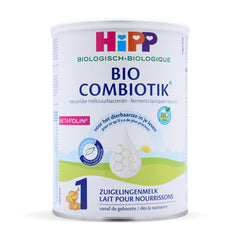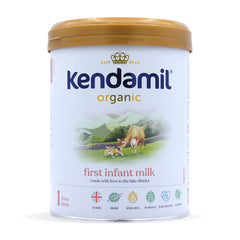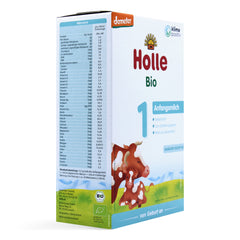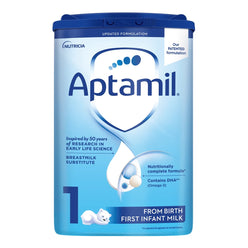Source of Carbohydrates in Baby Formula
48 hours of research4 minute read

If you've ever wondered why your baby needs to eat organic formula milk and not a regular formula, you're not alone. We get questions about this topic all the time! In this article, we'll explain what carbohydrates are in infant formula and how many carbohydrates there are in organic formulas compared to regular ones.
Carbohydrate Source In Baby Formula
Lactose is a sugar. It's found in milk, but it's also found in other foods like cheese and yogurt. Lactose is what gives milk its creamy texture and sweet taste.
Lactose has two simple sugars: glucose and galactose (or the molecule called D-galactose). These two simple sugars combine to form disaccharides, which are made up of two monosaccharides joined together via an ester bond between one atom on each monosaccharide chain (this is why we call them "disaccharides").
What Is The Main Source Of Carbohydrates In Infant Formula?
Carbohydrates are the primary source of energy for the body, and lactose is one type of carbohydrate. Carbohydrates are made up of carbon, hydrogen, and oxygen atoms that form a ring structure around a central atom (C = 2).
Lactose is a disaccharide made up of glucose and galactose in its naturally occurring state; it's not digested by humans because it reaches the colon before being absorbed into our system.
European Formula vs. American Formula
- European Baby Formula: Lactose as the primary carbohydrate
- USA Style Baby Formula: Corn syrup and sugar as the primary carbohydrates
Lactose is the best source of carbohydrates for babies, and European baby formula milk contains it. Given the numerous advantages of breast milk as an infant's first food, the best formulas closely mimic the composition of breast milk. This is why the European Commission requires lactose as the primary carbohydrate source in standard formulas, whereas the typical carbohydrate source in American-style formulas includes Corn Syrup, Corn Syrup Solids, Glucose Syrup, Brown Rice Syrup, and Sucrose (table sugar).
What Type Of Carbohydrate Is Found In Milk?
It is important to understand that lactose is not the same as other carbohydrates. It's a special type of carbohydrate found in milk, which means it's more difficult for our bodies to digest than other types of sugars. The benefit of this unique makeup is that you get all the energy your body needs from one source—the nutrients contained in the milk itself! This makes it easy for kids who don't have trouble digesting common sugars such as glucose or fructose (which are found in fruit).

Question: What Is The Primary Carbohydrate In Milk?
Milk is a good source of carbohydrates. The primary carbohydrate in milk is lactose, which comes from the milk's primary protein (casein). Other carbohydrates include glucose, fructose, and galactose.
Lactose: This sugar is found in all mammals' milk products and is responsible for their sweet taste. It has two sugars attached to it: glucose and galactose.* Glucose: Provides energy when digested by your body.* Fructose: This is an important source of energy that can provide you with more than twice as much energy as carbs like glucose or sucrose (which is table sugar).
Question: Is milk a protein or carbohydrate?
Milk is a carbohydrate source. It contains about 4 grams of protein and 8 grams of fat per cup. If you're looking to add more calcium to your diet, it's best to choose organic formula milk that has added calcium in its ingredients list instead of plain milk or other types of milk products with less than 3% total carbohydrates (including sugars).
Question: What is the percentage of carbohydrates in milk?
The percentage of carbohydrates in milk is approximately 4%. This means that for every 100 milliliters of organic formula milk, there are 44 grams of carbohydrates. In comparison, the same amount of cow's milk provides roughly 4% more carbohydrates than organic formula.
Question: How many carbohydrates are in organic formula milk?
The amount of carbohydrates in organic formula milk depends on the type of milk used. For example, if you choose to use skimmed or semi-skimmed milk, then the carbohydrate content will be lower than if you choose whole milk. The percentage of carbohydrates in organic formula milk is also dependent on how much water is added to it during processing and manufacturing.
The number of carbohydrates in organic formula milk depends on which type(s) of cow's milk was used during processing as well as whether any sweeteners were added (e.g., sugar).
Baby Formula With 100% Lactose As Carbohydrate
Lactose is the main carbohydrate in milk. Lactose is a disaccharide, which means it's made up of two sugars: glucose and galactose. The sugars that makeup lactose are glucose and galactose. European baby formulas are based on lactose, meaning they do not contain sugar or corn syrup.
Carbohydrates in European Baby Formulas
| Baby Formula Brand | Source Of Carbohydrates |
|---|---|
|
Holle |
Holle makes use of two carbohydrates: lactose and maltodextrin. The latter is a slower-digesting carb that keeps babies feeling fuller for longer. |
|
HiPP |
HiPP baby formulas are entirely lactose based. However, some of their variants, such as HiPP Anti-Reflux Formula, contain maltodextrin, which aids in reflux prevention by providing density to the food. |
|
Lebenswert |
Lebenswert uses only lactose as its source of carbohydrates. Additionally, Lebenswert lactose comes from Demeter certified (Organic++) biodynamic farming. |
|
Kendamil |
Kendamil's carbohydrate is made entirely of lactose, which means that parents are getting the best carbohydrate for their babies without the non-lactose sugars. |
|
Kabrita |
Kabrita's formulas contain the ingredient 'lactose,' which provides a valuable and ready source of carbohydrates for babies. |
|
Nannycare |
Lactose is the only carbohydrate found in Nannycare formulas. This is the milk sugar that occurs naturally in their full cream goat milk. As a result, they supplement naturally occurring levels by adding additional lactose as an ingredient to increase overall levels to mimic those found in breast milk. |
|
Aptamil |
Aptamil's baby formulas feature a diverse range of carbohydrate sources. For Aptamil Nutribiotik and Aptamil Anti Reflux, the primary carbohydrate is lactose. In the case of Aptamil Comfort, both lactose and maltodextrin are used, which is due to its reduced lactose content. Additionally, certain Aptamil formulas like Aptamil Gold+ and Aptamil Pepti do not include added lactose. |
Holle Formulas With Lactose
Holle is an organic infant formula brand that was founded in 1933 and has been serving parents for more than 85 years. Demeter Certified (organic++) formulas free of synthetic additives, preservatives, and pesticides are available from the company.
Holle is based in Riehen, Switzerland, and its organic formulas are available in over 40 countries. Holle has gained the trust of many parents due to its high quality ingredients. Holle organic formulas based on cow and goat milk are available. If your child is allergic to cow's milk, parents can choose goat milk-based formulas.
HiPP Formulas With Lactose
HiPP was founded in 1899 by Joseph HiPP with the goal of producing healthy baby formulas from super sustainable ingredients. HiPP infant Milk Formula products are made entirely from organic and GMO-free cow's milk. These dairy cows are fed a diet free of antibiotics, pesticides, mineral fertilizers, and growth hormones.
HiPP baby formulas are marked as BIO because they are produced in accordance with the EU Regulation on Organic Farming. A wide selection of HiPP formulas can assist you in selecting the product that best meets the needs of your baby.
Kendamil Formulas With Lactose
Kendamil was developed by Kendal Nutricare, a company owned by Ross McMahon. The use of cheap, processed oils in traditional formulas, as well as unsustainable farming practices, prompted the introduction of Kendamil baby formula products. According to Ross McMahon, the product tastes different when animals are fed fertilized crops. He couldn't understand why other baby formulas substituted palm oil and fish oils for breastmilk.
The company's mission was to make formulas with natural mammal milk fats and to ensure animal welfare at any cost. Stress-free animals fed on organic farms produce nutrient-rich milk that is both delicious and easily digestible.
Kabrita Formula With Lactose
Kabrita is derived from the Spanish word "cabrito," which means "baby goat." Kabrita has 75 years of experience producing goat milk-based baby formula, staying true to its roots. Kabrita is a division of Ausnutria, a multinational corporation. The Ausnutria factory was founded in 1897. It now makes goat milk-based baby formulas, cereals and snacks for babies, private label baby formula, and a wide range of dairy products and ingredients.
Kabrita has approximately 50 goat farmers who only supply milk to Kabrita. Only Dutch white Saanen goats are used, which are well-known for producing high-quality milk. KwaliGeit quality assurance protocols are strictly followed by the farmers.
Nannycare Formula With Lactose
Nannycare uses gentle milk transportation to maintain nutritional integrity. It is produced in a world-class facility that only produces goat milk baby formula.
The goat milk is produced by a cooperative of 71 farmers in New Zealand's richest pastures that only produce goat milk baby formula.
Nannycare is a New Zealand-based family-run business. It was the first company to bring goat baby formula to the mainstream market. It has made a significant contribution to the product's legislation in the EU and the United Kingdom.
Aptamil Formulas With Lactose
Aptamil began in Germany and quickly became known for its high-quality formulas. The brand's commitment to providing top-notch, science-based infant nutrition has made it a trusted name in the industry. Aptamil also follows the recommendations of global health authorities like the World Health Organization (WHO) and the European Food Safety Authority (EFSA) in their products. There are other Aptamil formulas known for having no added lactose such as the Aptamil Gold+ and Aptamil Pepti.
In Summary - Carbohydrates In Formula
The carbohydrates that are found in milk are lactose and galactose. These are the most abundant carbohydrates found in milk, with about 90% of milk’s total carbohydrate content being made up of these two sugars. The remaining 10% comes from other types of sugar molecules such as maltose and sucrose (which are both disaccharides).
Milk carbohydrates play a vital role in providing energy and supporting the growth of infants. Lactose, the primary carbohydrate in milk, serves as a valuable energy source. The body breaks down lactose into its component sugars, glucose, and galactose, which are readily absorbed and utilized for various bodily functions. Galactose, another crucial component, is derived from lactose during digestion. These carbohydrates collectively contribute to the essential nutritional composition of milk, making it an optimal source of sustenance for growing infants.
Most Popular Lactose-Based Baby Formulas
Organic Life Start is committed to providing accurate, reliable, and trustworthy information to parents and caregivers. We carefully choose credible sources and follow a meticulous fact-checking process to uphold the highest standards in infant nutrition and parenting advice. To learn more about our dedication to accuracy, please explore our editorial guidelines.
Link To Sources

















Lesley Paris -
I’ve been using Holle Bio for my boys, Alejandro and Watsons, and I have to say that it’s the best decision I’ve ever made for them. I love that lactose is the main source of carbohydrates because it is much more like breast milk and is gentler to their developing stomachs. It is the main source of carbohydrates, which I sincerely enjoy. I used to worry about fussiness and gassiness with Enfamil, but with Holle Bio, they both complete their bottles without any problems and are much happier after feeding. Their degree of comfort and contentment has changed, and I feel more at ease knowing exactly what I’m putting in their bottles. When I watch them grow stronger and happier after feedings, I know we’ve found the right formula for them.
Yolanda T. -
I’ve been giving my little Thalia Holle Bio, and it makes me happy to know that she’s receiving the proper nutrition, particularly the carbohydrates she needs to keep active and develop her strength. I just want to keep things straightforward and healthy for her as a mother, and Holle provides me with that comfort. After spending some time learning about the various sources of carbohydrates in formula, I was even more assured of our decision when I discovered that Holle uses lactose, just like breastmilk. Thalia has been doing well on it, and knowing that she is receiving all of her daily needs is such a comfort.
Rebekah Lincoln -
When choosing a baby formula, I always check the type of carbohydrate used—some formulas use lactose, while others rely on corn syrup solids or glucose. I personally prefer formulas that use lactose, since it’s the primary carbohydrate found in breast milk. From my experience, formulas with corn syrup or maltodextrin sometimes caused more gassiness and discomfort for my baby. Reading the ingredient list closely helped me feel more in control and informed. I also learned that European formulas like HiPP and Holle often prioritize lactose, which aligned better with my feeding goals.